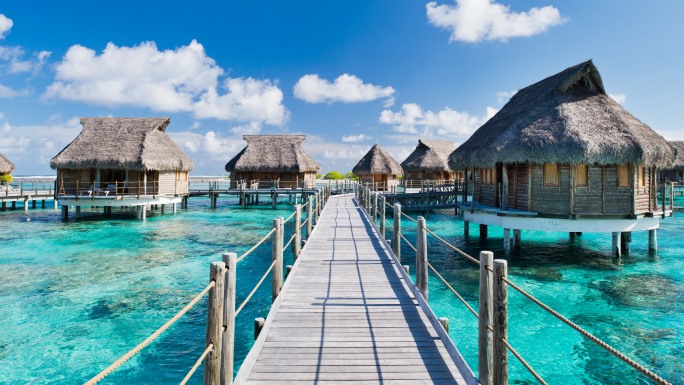Diverse careers in hospitality and tourism: match your talents
10th August, 2023

In this article
If you’re passionate about creating great guest and customer experiences, the hospitality and tourism industry offers many exciting career opportunities.
Hospitality and tourism is a booming area with great opportunities to progress or move into more niche areas.
Here, we’ll explore the different jobs in tourism and hospitality and why studying hospitality and tourism can boost your career.
Understanding the hospitality and tourism industry
The hospitality and tourism industry comprises a diverse range of services to deliver attentive fulfillment of customer needs, promote and plan travel and create great customer experiences.
The industry encompasses accommodation, food and drink, transport, events and attractions and plays an important role in the global economy.
What is the hospitality industry?
Hospitality is a vast industry, incorporating businesses focused on delivering services from refreshments to accommodation and transport. It includes hotels, bars, restaurants, resort management, theme parks and cruise ships.
The hospitality industry is about creating a welcoming environment for guests and offering tailored experiences that meet customer needs.
What is the tourism industry?
Tourism is a key part of the hospitality industry and offers services to those traveling for pleasure or business. It can include domestic tourism, where people travel in their home country, and international tourism.
It can also encompass sightseeing, eco-tourism, cultural tourism, business travel and even adventure tours.
Where will a career in hospitality take you?
Learn how a career hospitality opens up a world of opportunities.
Explore the possibilities
Job roles and career paths in hospitality and tourism
There are many jobs in tourism and hospitality. It’s common for hospitality and tourism careers to begin with entry-level roles before progressing to management roles.
What are the different job roles in the hospitality industry?
Hospitality is wonderfully varied. There are plenty of opportunities to develop your career in a wide range of roles, including:
- Concierge: provides guests with information about the hotel and local amenities, assists with bookings and arranging services
- Housekeeping supervisor: oversees the cleaning and maintenance of the hotel
- Front desk agent: takes reservations, handles guest check-ins, deals with guest queries and provides customer service
- Hotel manager: has overall responsibility for the hotel management and operations
- Food and beverage manager: oversee all restaurant operations
- Chef: runs the kitchen at hospitality venues
- Spa manager: manages all spa operations, including services, facilities and staff
- Event coordinator: organizes and plans all types of events
- Sales and marketing manager: develops and implements sales and marketing strategies to promote the business
- Revenue manager: optimizes hotel revenue by managing room rates and inventory
What are the different job roles in the tourism industry?
Tourism offers many job roles with the chance to travel, meet new people and create excellent customer experiences. Here are just a few:
- Travel agent: assists customers with planning and booking travel arrangements
- Tour guide: provides information and guided tours to travelers
- Event planner: organizes conferences and events
- Travel writer: writes articles or blog posts about travel-related topics
- Sales and marketing manager: responsible for creating and implementing strategies to promote tourist and business destinations, attractions or travel services
- Hospitality manager: oversees operations at tourist attractions and visitor destinations
- Adventure tour operator: coordinates and runs outdoor adventure activities and experiences
What are the career pathways for hospitality and tourism?
There are various career pathways in hospitality and tourism, with different roles and levels of responsibility. These pathways typically include:
- Front-line service positions, such as housekeeping and front desk
- Operations and management, including hotel and restaurant manager positions
- Sales and marketing careers
- Event planning and management
- Travel and tourism, which typically includes tour guides and travel agents
- Hospitality technology positions, such as IT managers
Front-of-house positions
What are front-of-house positions?
While the roles will vary depending on the type of hospitality and tourism business, some common front-of-house positions include:
- Guest relations manager
- Host
- Server
- Bartender
- Concierge
- Front desk agent
- Sommelier
- Cashier
- Greeter/usher
Master the essentials of tourism management
Refine and develop industry specific knowledge infused with invaluable practical expertise to thrive in the exciting international arena of tourism management
Masters in tourism management
What skills are required for front-of-house roles?
Depending on the type of hospitality and tourism business, front-of-house roles typically require a combination of customer service and technical skills. For example:
- Effective verbal and written communication skills
- Strong customer service skills, such as being attentive, friendly and responsive
- Interpersonal skills, for example, building rapport, actively listening and maintaining professionalism
- Effective problem-solving skills and the ability to think on your feet
- Excellent organization and time management skills
- Attention to detail
- Strong teamwork, collaboration and leadership skills
- Good product and service knowledge
- Proficient at using point of sale (POS) systems if required
Back-of-house positions
Back-of-house roles are those guests typically do not see and are essential for the smooth operations of a hospitality or tourism business.
What are back-of-house positions?
Some of the common back-of-house positions you may find include:
- Food and beverage manager
- Chef
- Sous chef
- Line cook
- Pastry chef
- Purchasing manager
- Housekeeping staff
- Facilities manager
- Maintenance technician
- Sales and marketing
- Finance and revenue management
What skills are required for back-of-house roles?
Some of the core skills for back-of-house roles include:
- Collaboration and communication
- Detail orientation
- Multitasking
- Ability to work to strict and changing deadlines
- Good motivational and delegation skills
- A proactive attitude
- Exceptional teamwork and leadership skills
Management and leadership roles

Management and leadership roles in hospitality and tourism involve overseeing departments. These roles are typically responsible for hiring, training and managing staff.
What are the management and leadership roles in the hospitality and tourism industry?
Here are some examples of common management and leadership roles in the hospitality and tourism industry:
- Hotel general manager
- Front office manager
- Event manager
- Food and beverage manager
- Spa manager
- Sales and marketing manager
- Revenue manager
- Human resources manager
- Property manager
- Maintenance manager
When it comes to the difference between hotel management and hospitality management you need to know that while hotel management is focused on hotel operations, hospitality management is much broader.
Hospitality management encompasses a wider range of services and sectors such as restaurants, tourism and event planning.
How can you progress to managerial positions?
There are several different ways you can progress to managerial positions in the hospitality and tourism industry, for example:
Qualifications and training
A degree in hospitality management or a related field will give you valuable knowledge, strong hospitality management skills and experience managing departments.
It provides an excellent foundation and puts you on the right path to a successful career in hospitality and tourism management. Hospitality internships will also give you crucial hands-on training and experience.
Gain relevant industry experience
Working in entry-level roles will give you a solid introduction to the industry and an understanding of different operational aspects of the business.
Promotions
Look out for internal job opportunities where you’re currently working. Consider your current role and the positions above it and think about what path you can take that will make the best use of your skills and experience to climb the career ladder.
Securing a management position
Once you’ve built up skills and experience, it may be the right time to ask your employer about advancing to a managerial role. If there aren’t any suitable vacancies in your current workplace, you may need to consider moving somewhere new.
Specialized and niche careers
Specialized and niche careers in hospitality and tourism cater to specific areas of the industry, requiring specific knowledge in the respective area.
What are some specialized careers in hospitality and tourism?
Specialized careers in hospitality and tourism offer a variety of exciting opportunities, such as:
- Travel consultant: help customers find accommodation, transport, dining and entertainment
- Sommelier: manage a business’s wine inventory and service staff and share your passion and expertise with customers
- Luxury travel advisor: curate bespoke travel experiences for high-end travelers, including personalized recommendations
- Culinary tourism specialist: develop and lead culinary tours and share your knowledge of local cuisine and food traditions to create immersive culinary experiences
- Adventure tour guide: lead and guide travelers on adventurous outdoor activities such as hiking or wildlife safaris
- Sustainable tourism consultant: promote environmentally friendly practices within tourism, advising businesses on socially responsible strategies.
- Destination wedding planner: organize and coordinate weddings at specific destinations
How can you pursue a niche career in the industry?
Start by immersing yourself in your chosen niche, researching industry trends and practices and the specific skills required. You may need to gain a particular qualification or embark on training for the knowledge and skills you need.
Internships, part-time roles and volunteering can help you gain hands-on experience, develop a deeper understanding of the niche and make valuable contacts. Specialist careers typically have limited job openings and you may have to start in an entry-level position to gain experience.
Education and training for hospitality and tourism careers

A degree in hospitality management and tourism is an ideal foundation for a rewarding career in hospitality and tourism. There are also certificate programs, industry training and internships to enhance your skills and experience.
What education is required for careers in hospitality and tourism?
For an entry-level position, you’ll usually require a high school diploma or equivalent and then on-the-job training.
For more advanced positions, you can expect to need a hotel management degree. If you’re interested in managerial roles, it’s a good idea to consider a master’s degree.
Skills and qualities for success in hospitality and tourism
For a career in hospitality and tourism, you need a range of skills, such as:
- Communication
- Customer service
- Teamwork
- Problem-solving
- Complaint handling
- Time management
- Flexibility
- Resilience
Exploring high-paying and prestigious career paths
Top hotel brands offer a number of exciting, prestigious and high-paying career paths. These businesses have a reputation for offering exceptional service and the ultimate guest experience. Here are some examples of high-paying and notable career paths:
- Hotel manager: responsible for hotel operations, ensuring guest satisfaction, managing staff and optimizing revenue. Salary range: $93,000 to $138,000.
- Food and beverage manager: manages the business’s food and beverage operations, including menu planning, maintaining quality and customer experiences. Salary range: $66,000 to $93,000.
- Event manager: coordinates and hosts events, including corporate functions and weddings. They must handle budgets, manage vendors and deal with logistics. Salary range: $94,000 to $121,000.
- Sales and marketing manager: drives revenue by promoting the business, attracts customers by devising marketing strategies and manages sales teams. Salary range: $94,000 to $125,000
How to pursue a career in luxury hospitality management
For a successful career in the exclusive world of luxury hospitality management, you need a recognized luxury management degree from a prestigious hospitality school and, importantly, hands-on experience in a luxury hospitality business.
It will also help you advance if you’ve already begun building a professional network and developing specialized skills to bring to your role.

















